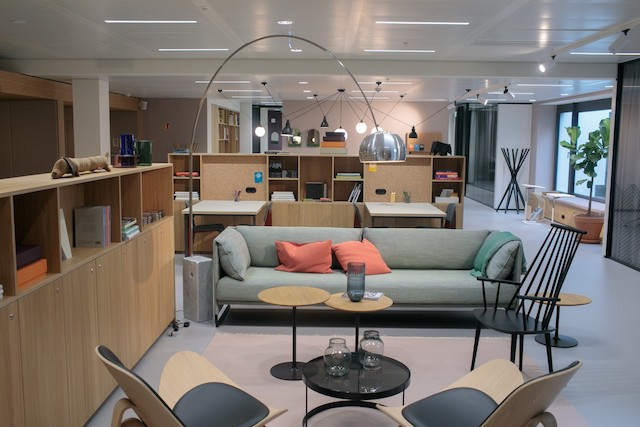Teleworking has weighed heavily on coworking trends. "We have indeed been impacted by the health crisis due to less presence of our customers,” explains William Willems, CEO of Spaces Luxembourg, which specialises in shared workspace rentals. “We have seen a disappearance of certain revenues related to the services available in our facilities.”
Spaces opened its first 6,500m2 space in Luxembourg in the Impulse building next to the capital's central train station in November 2019. A second 4,500m2 site opened in October 2020 in Hamilius on Boulevard Royal with a third anticipated in front of the Cloche d'Or shopping centre in the first quarter of 2022.
"On average in Europe, the square metre uptake in annual rental has fallen by 43%," explains Alain Brossé, CEO of Welkin and Meraki, an operator of on-demand, high-end workspaces for businesses. With locations in Luxembourg--as well as Eindhoven, Paris and Brussels--the company still posted a turnover growth of 15%. “Normally, we [experience] a growth between 30% and 50%. But I am still proud to post a growth of 15% in the current environment. This growth can be explained by our business model insofar as, unlike operators like Regus or Spaces, we are a little different and we sign...for periods of two to three years,” says Brossé, who was busy finalising a contract with a very large global customer.
Tram works, coupled with the pandemic
"The turnover has fallen, but the good news is to have succeeded in maintaining a completely reasonable occupancy rate in our sites open before the crisis," says Spaces CEO Willems, who nevertheless doesn’t hide the difficulties encountered by Spaces Gare: “It was a little more complicated. In addition to the health crisis, the works on the tram made accessibility to the area very difficult for eight months. Today we are seeing an upturn in our rentals, and I hope that by the end of the year we can achieve a reasonable occupancy rate with a target of 70%.”
Over on Boulevard Royal, the occupancy rate was 50% last year, supported by the presence of a major customer occupying a third of the area, pending the availability of its new premises. In addition, Spaces welcomed clients from Regus (which belongs to the same group) for renovation purposes. “There are a large number of companies that are redesigning their square metre policy,” Willems adds. “You have to be creative in a Luxembourg market which is not a market where it is easy to rent at attractive prices. We offer this possibility in addition to flexibility. The current crisis has shown that the world of work can no longer afford large concentrations of space. It’s easier to use an operator like us to diversify and relocate its workforce, to do cellular work.”
He hardly believes in teleworking as a miracle solution: “I am absolutely convinced that teleworking has its limits. It is expensive for employees. There are statistics which show that teleworking costs more than €350 per month if you add internet connection, electricity consumption, heating, coffee, water, etc. If you want to buy an apartment with a space dedicated to teleworking in Belgium, you need €30,000 more in your budget. With real estate prices in Luxembourg, you can easily multiply the sum by three," he believes.
In Luxembourg, no study has officially quantified the cost of teleworking for an employee. In France, however, studies have estimated this cost between €13 and €186 per month.
Still strong demand for flexibility
Coworking is not dead and, according to Brossé, the world of work will be moving towards a certain balance between teleworking and coworking. But in Luxembourg, the decision to rent workspaces takes time. “I see that decision-making is slower than before the health crisis,” he says. “Today it takes between 60 and 120 days to have a decision, whereas it used to take 30 days. I think we're going to be in the same boat until September, and I don't even know if we'll get back to normality before. You may need to get the vaccine every year. I think we're going to be heading for a hybrid [model]. There will still be offices but perhaps offices with 10 places for a team of 20 people, and the company will operate in rotation,” the Welkin and Meraki CEO explains.
But he remains optimistic, noting a "demand from corporate clients for more flexibility. According to experts, this demand will increase by 20 to 30%. Companies have seen what the fixed costs represent, which are difficult to bear during a crisis," Brossé says.
He still feels certain as well that " humans need people and interaction, even in business."
This article was originally published in French on Paperjam and has been translated and edited for Delano.
